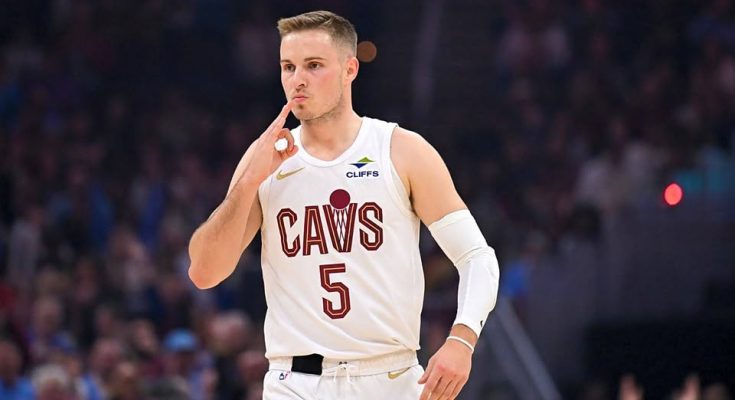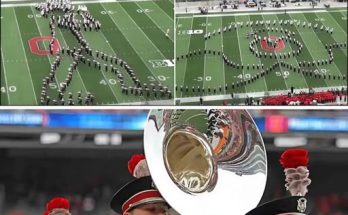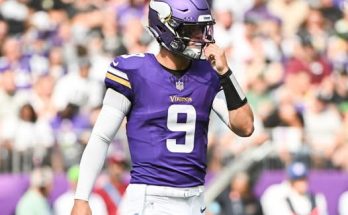“This is where we wanted to be,” Merrill told Chris Fedor of Cleveland. “I’m super excited. Cleveland is a great city and I think we’re building something really strong.” Those words, spoken by Cleveland Cavaliers sharpshooter Sam Merrill, echo far beyond just offseason optimism—they represent a man who has quietly carved out a role in a franchise that has been trying to rediscover its identity in the post-LeBron James era. For Merrill, this moment is not just about being on a roster, it’s about belonging, growing, and evolving with a team that is trying to do the very same thing.
Sam Merrill isn’t a name that typically jumps off the page when NBA circles discuss up-and-coming contributors. Yet in Cleveland, his development has become one of the more quietly promising stories within a team searching for both consistency and upside. A former second-round pick out of Utah State, Merrill was largely an afterthought when he entered the league in 2020. Drafted by the Milwaukee Bucks and later waived, his NBA journey included stints with Memphis and brief moments of promise in Summer League and G-League action before he found a more stable footing with the Cavaliers. That stability didn’t come with an automatic green light or a guaranteed contract, but it came with a culture of accountability and a front office that believed in specialized skillsets—particularly his elite perimeter shooting.
Merrill’s excitement to be in Cleveland isn’t empty PR fluff. He means it. This is a player who understands the grind it takes to survive in the NBA. His story is one of those that usually gets tucked away in the margins of team media guides—undrafted or low-drafted prospects who bounce between contracts, teams, and leagues in pursuit of that one opportunity to prove their worth. What makes Merrill different, however, is his steadfast determination to stay ready and his clear recognition that fit matters. In Cleveland, he has found not just a role but a vision. The Cavaliers need shooting. Merrill offers it. The Cavaliers need unselfish, intelligent players who can thrive off the ball and complement high-usage stars like Donovan Mitchell and Darius Garland. Merrill checks that box, too.
But there’s something deeper at play here. Merrill’s commitment to Cleveland reflects a culture shift within the franchise. This isn’t the same Cavaliers team that was built entirely around LeBron’s gravitational pull. This is a team trying to build something sustainable, something that can compete in the East even without a top-five player on its roster. It’s not a flashy rebuild, and it’s not a fire-sale tear-down either. It’s somewhere in between—a franchise leaning on internal development, smart signings, and a coaching staff that is beginning to define its post-Bickerstaff identity under new leadership. Merrill’s voice, small as it may seem in the broader NBA chorus, signals that players recognize what’s being constructed in Cleveland is legitimate.
His role on the court might not demand 35 minutes a night, but it’s the kind of position that can swing games—especially in the modern NBA where spacing and shooting have never been more valuable. The Cavaliers had issues with floor spacing in the playoffs, particularly when their stars were trapped or denied penetration lanes. Inserting a high-IQ shooter like Merrill into lineups opens up new options. He stretches defenses. He commands close-outs. And perhaps most importantly, he doesn’t need the ball to be effective. That kind of player is essential when your offense is built around three ball-dominant guards and a big man like Evan Mobley who is still developing his range and offensive fluidity.
Merrill’s shooting stats speak volumes. He shot over 40 percent from three-point range during key stretches of the season, including games where he came off the bench cold and immediately knocked down big shots. It’s that sniper quality that not only earns respect but also makes a coach’s job easier. Coaches can script offense, design actions, and run sets—but ultimately, spacing is about gravity. And Merrill, even when he’s not taking ten shots a game, has started to generate that gravitational pull defenders can’t ignore. He isn’t just floating in the corners hoping for scraps—he moves off-ball with purpose, reads defensive breakdowns well, and has shown he can hit transition threes and tough catch-and-shoot looks with defenders draped all over him.
Yet, what truly separates Merrill isn’t just the skillset. It’s the attitude. He’s the kind of player teammates root for because they see the work behind the scenes. The late-night shooting sessions. The film study. The humility. The willingness to accept whatever role is asked of him. It’s no surprise that he speaks so fondly of Cleveland—not just as a city, but as a basketball ecosystem. It’s a place where hard work is valued and where role players can thrive if they buy into the collective. Merrill fits that mold perfectly. He isn’t clamoring for stardom; he’s contributing to the climb.
From a roster construction standpoint, his presence gives Cleveland more optionality. They don’t have to overextend Garland or rely solely on Mitchell for perimeter shot-making. Merrill gives them shooting insurance. And with a new coaching staff taking over in 2025, it’s expected that floor spacing and ball movement will be more emphasized than in years past. In that context, Merrill may be looking at his most impactful season yet. If Cleveland wants to take a step forward, especially in the grueling Eastern Conference, it will require players like Merrill stepping up in key moments—hitting a game-changing three, making the right defensive rotation, or spacing the floor to keep defenses honest.
It’s not just about a feel-good story anymore. It’s about relevance. Cleveland made the playoffs last year but sputtered when it mattered most. This upcoming season is about converting potential into performance. The pieces are there: a defensive anchor in Mobley, a scoring engine in Mitchell, and now a rising contributor like Merrill who can glue together mismatched units with his floor spacing and team-first mentality. If he continues his growth trajectory, he could become more than just a rotation piece—he could become a vital cog in the Cavaliers’ long-term plans.
There’s also the intangible element of trust. Merrill has earned trust—not just from teammates but from the front office. When a player on a non-guaranteed contract makes a roster and plays with confidence, it sends a message to younger players and fringe veterans alike: stay ready, stay professional, and your shot will come. Merrill’s professionalism, even when he wasn’t seeing major minutes, resonated in the locker room. He remained prepared. He stayed vocal without overstepping. And when his number was called, he performed.
His story is also a reminder of how success in the NBA is often about more than talent. It’s about fit, timing, and opportunity. Merrill could have easily been out of the league if he hadn’t found the right system. But in Cleveland, he’s found a system that values his strengths and a coaching staff willing to trust him in big moments. He doesn’t take that for granted. “This is where we wanted to be,” he said—not just as a career move, but as a genuine endorsement of the team’s trajectory and the city’s embrace.
Cleveland is far from a glamour market, and the Cavs are far from a superteam. But that may be exactly why players like Merrill are so valuable. They bring a chip on their shoulder, a quiet hunger, and a relentless work ethic that fits the city’s ethos. They don’t demand headlines. They demand respect. And with another strong season, Merrill is well on his way to earning just that.
Whether he remains a sixth or seventh man or eventually climbs into a bigger starting role depends on how Cleveland evolves. But right now, he’s in the perfect spot. A spot that he’s proud to call home. A spot he fought for. A spot he’s earned. And in an NBA world that often overlooks the quiet contributors in favor of loud stardom, Merrill is showing that substance, steadiness, and shooting can still carve out a path.
If the Cavaliers continue to build around the core of Mitchell, Garland, Mobley, and Allen, they’ll need more players like Merrill to fill in the gaps. The league isn’t just about stars—it’s about complementary pieces that amplify those stars. Sam Merrill is becoming one of those players. He’s not just a good shooter. He’s a great fit. And more importantly, he wants to be in Cleveland, to grow with Cleveland, and to win in Cleveland.
In a league driven by constant movement, with players and franchises often parting ways before something sustainable takes root, Merrill’s sentiment stands out. It’s not flashy. It’s not dramatic. But it’s sincere. And sometimes, sincerity is what championship teams are built on.



